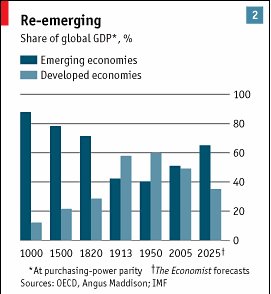
This is the gist of how "The Economist" describes globalization. The Developed Economies, who were enjoying a dominance in the world economy now having to share it with the rest of the emerging world. This is a write up from one of the bunch of surveys on "The New Titans" conducted by Economist.
1. Emerging Economies:
At purchasing power parity (PPP) the emerging world contributed to more than 50% of the world's GDP last year although at current $ terms they still contribute to about 30% of the GDP only. The survey calls this the biggest boost to the world since the Industrial Revolution.
a. The fact that this era has such a huge impact is because this revolution is all round the globe where as the previous Industrial Revolution covered only one-third of the globe.
b. The BRIC that constitute the four major Emerging Economies (EE) of the world today contribute to two-fifths of the GDP of EE and are had an YoY growth consecutively for the last three years.
2. Re-emerging Economies:

The above graph compares the Emerging-Developed emerging economies over a period of time. Emerging economies have been growing @ an avg. rate of 7% and looks like if they continue to do that over a period of 10-15 years then these economies would produce two-thirds of the global output.
Interesting Fact: When America and Britain were industrializing in the 19th century, they took 50 years to double their real incomes per head; today China is achieving the same feat in nine years.
a. Current Status in the Emerging Economies: The current weakness of emerging economies (according to Morgan Stanley Economist) is no longer their dependence on external finance, as in the 1990s, but their dependence on external demand.
3. Emerging Economies started Running:

Its indeed very heartening to see India in the above graphs. While we need to wait a bit more to see if this turns into a reality but the fact that we are heading somewhere towards instills a degree of confidence.
Go grab the latest edition of "The Economist" or check out Economist website if you find this interesting because i think it gives a pretty good insight about the overall globalization era !!
My Ideas:
While all the above stated facts paint a rosy picture of the emerging world these are some of the issues that India, as an emerging economy has to address if it has to go anywhere near or sustain if it happens to get there !! ….I do agree that things are easier said than done …yet…….. !!
Level of Corruption:
There is no country in this world which has zero corruption but according to me the levels at which the corruption begins determines how frequently the common man has to suffer in his day to day life. The lower levels administration with whom the common man interacts on a day to day basis has been free from corruption in most of the developed countries and that should start to happen in India.. In recent discussions with some of my colleagues I've realized that we have started accepting administrators who are corrupt but yet get some work done to those who are completely corrupt or those who are not corrupt but don’t get the work done !!
Wealth Distribution:
One of my friends brought up this point of wealth distribution in his blog..i.e are the rich becoming richer and poor becoming poorer ?
When we chose to be a kapitalistic society by introducing the economic reforms of 1991, the wealth distribution is bound to widen unless we create an equal opportunity society (no i’m not talking about reservations !!) by focusing on improving our poverty l line by creating basic health care and primary education ! I guess we are on the right track but we’ve a long way to go in that !
Dignity of Labor: This has been in my mind for a while… I don’t know if this is my myth or true …but I somehow feel that there is significant difference in # of people who do their job with pride and respect in the developed economies than in India …. I don’t know if this is becos of the minimum wage being high in those countries bringing into picture the standard of living … or it’s the fact that we are not able to identify the importance of the role they play …
Equal Opportunity: This is one aspect that we need to start accepting as a fact of life and move away from all kind of reservations (except for the financially weaker sections … and should not be based on any other criteria …)
I hope some of these will be achieved by 2040 .... !! If you can think of any other issues on the top of your mind while reading this blog ...feel free to post your ideas ... !
PS: All the graphs posted in this writeup are taken from economist.

1 comment:
This reminds me of one of the articles I had read on "Emerging world politics" while i was doing macro... you might find it interesting too read it..
http://www.opendemocracy.net/democracy/article_1633.jsp
Post a Comment